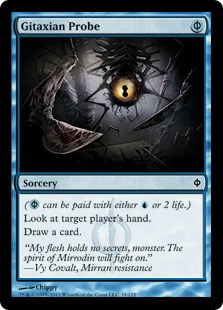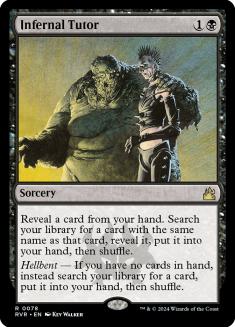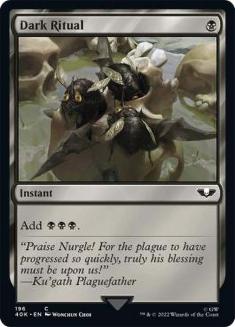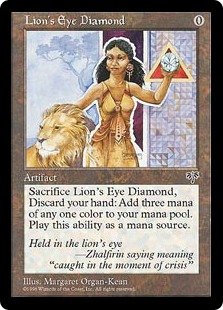Greed is traditionally considered the third deadly sin. Hopefully, for all of us Magic players out there trying to win as much as possible, there’s an exception for greed in gaming—because being greedy at the right time and in the correct way is an important tool to maximize your ability to win tournament games of Magic. To my knowledge, no article so far has explored that concept in depth—I’m probably wrong on that, as there are a lot of good articles out there I’ve never heard of—so today I’ll be channeling my inner Luis Scott-Vargas and trying to tackle this subject.
Realistically, to fully recognize the potential behind being greedy, we first need to understand what exactly we mean when talking about greed as far as Magic is concerned and how it manifests in deckbuilding and during gameplay. Following that, we will explore its possible benefits and costs before looking at two examples where being greedy is definitely the correct play. Interested? Let’s get to it then!
What Greed Is
Essentially what "being greedy" boils down to is this: choosing the high-risk, high-reward option over the conservative, more stable but lower maximum value option. This could be anything, from Bolting our opponent before we’re sure they’re in reach, hoping to topdeck another burn spell to win a turn earlier than we otherwise could and playing all nonbasics in a format with Blood Moon to something as simple as keeping the six-land, five-cost bomb-they-can’t-beat hand in Limited. Greed can be employed during deck construction (going all nonbasics a la Esper Deathblade to get access to all the great cards), when deciding how to mulligan (the dreaded no-land hand) or how to sideboard (adjusting a little or trying to change things completely), and obviously during the game itself (from playing library manipulation instead of keeping up countermagic to fetching a nonbasic versus a Wasteland deck).
Every single one of these scenarios has two distinct outcomes. Depending on circumstances outside of our control (our topdecks, the opponent’s hand and deck, etc.), we can either win with extreme ease or lose horribly. That’s what being greedy usually comes down to—you either get to play from extremely far ahead or end up being run over like a goldfish out of its bowl.
During a game, you’ll have a lot of opportunities to choose between greed and consistency—and you usually simply can’t know which choice is the right one in this particular game. Imagine you’re playing U/B Control in Standard and on turn 4, with Think Twice, Negate, and Essence Scatter in hand, you miss your fourth land drop. You now have two options. You could pass the turn, keep your counters up to defend yourself, and Think Twice at the end of their turn if you don’t need to counter anything. This is the conservative play. On the other hand, you could flashback the Think Twice now, hoping to hit the land but exposing yourself to whatever the opponent plays in case you miss. That would be listening to greed.
3 things influence how greedy your play is: how necessary it is to win the game (if it’s your only choice, how could it be greedy?), how bad things get for you if whatever you’re betting on doesn’t happen (the worse the results, the greedier the play), and how likely it is for the desired outcome to actually arise (the more unlikely the event you’re hoping for, the greedier the play once again).
When Greed Is Good
By now, we can all agree that being greedy is a dangerous business and a tool that needs to be used with care. The question then becomes when is being greedy the right move? The theoretical approach makes this choice seem quite easy; you should be greedy when it gives you a better chance to win overall than making the conservative play would.
Because we’re real human beings and not futuristic overlords that can observe beforehand where our choices will lead us, though, which play has a higher chance of winning the game is usually very difficult to determine. Luckily there are a few useful pointers that can help us with this decision.
Probably the most important thing to consider is the number of outs/fails we have. If we decide to keep that one-lander on the draw, we know we will most likely need one of our next two cards to be a land to really get going. Luckily, the likelihood for that to happen barring library manipulation is easy enough to calculate. In a 60-card deck with twenty lands, you now have nineteen lands left in your 53 remaining cards, meaning you have a chance 34/53 chance for your first card to not be a land and a 33/52 chance that the second card isn’t either. That means you have a 1122/2756 or roughly 40% chance of not getting that second land.
Assuming we expect to lose the game every time we miss that second land drop but will almost always win if we do (say because our hand is full of insane two-drops), that gives us roughly 60% to win if we keep this hand. Once we’ve figured that out, all we have to worry about is if our chance to win with a random six-card hand is likely going to be higher than that or not (I can think of a lot of situations where a 60% win rate is a great achievement) and we know if we should be greedy here.
You will probably tell me now that you won’t get to use a calculator during the tournament to figure out those odds—and rightfully so, mind you. Luckily working with estimates is much easier. Say instead of 34/53 and 33/52, we just assume those are both 30/50 (or 3/5). That would leave us with 3/5*3/5 or 9/25 to not get there. 9/25 is easily transformed into a percentage of 36% likelihood to lose (just multiply both the 9 and the 25 by 4)—which is close enough to reality for us to work with.
2 players still shouldn’t necessarily make the same decision, though, even given the same hand in the same matchup. That’s where personality and skill differential become important. Some players can deal with missing and losing without a real game better than others. In the interest of future play, you should stay away from greed more if you tend to tilt due to variance. Similarly, if you’re a better player than your opponent, you’re more likely to win real games of Magic against them, so being greedy becomes less justified the bigger the skill differential in your favor. If you’re the weaker player, on the other hand, greed might one of your best paths to victory.
Lastly, one very good reason to be greedy directly leads us back to win percentages; if our matchup is bad, we should be quite happy with any shot at winning the game, as risky as it may be. If our inherent matchup is very good, on the other hand, going all in on drawing that land starts to look like a terrible idea.
The Costs Of Greed
If we consider getting greedy, we should always keep in mind what it could end up costing us. Many players hate to make greedy plays, and for good reason; if we miss, we will often put ourselves far enough behind to make the rest of the game into a farce. Just imagine we keep that one-land hand from above and don’t ever draw our second land. We’ll be left passing the turn a lot while our opponent goldfishes us—not exactly the most fun way for a game to go, is it?
For the true Spike, this shouldn’t really be a consideration, though. By definition, our goal is to win as much as possible; how good or bad the games are is secondary. Trading in a couple of really boring losses for a bigger number of similarly one-sided wins should be in our interest each and every time. The problem comes when we get things wrong—maybe our opponent mulligans to five and we can’t punish them or maybe they drew the six good cards in their terrible Draft deck game 1 and now get to win with the crappy rest because we aren’t doing anything because we kept a risky hand after being intimidated game 1.
Every time you make a greedy decision, you flip a (hopefully weighted) coin to decide if you win or lose—and choosing wrong will lead to some terrible experiences. You might spend the whole day doing nothing because Blood Moon dominates your greedy all nonbasic mana base, you might spend games not casting spells because of greedy mulligans, and you could run into Dredge every other round after cutting your graveyard hate to profit from the fact nobody plays that deck anymore. Whatever it is you do, be aware that you’re playing with probabilities and that greed will be punished at some point—and punished harshly.
Getting Greedy
Dancing on the knife’s edge intentionally makes sense only in some situations and contexts, as should be evident from the above. What I’d like to end this article with is a look at two cases where being greedy is the correct line to take just so you get an idea of how far you can take your greed and still be doing it right.
Ravnica’s—the original one—release Pro Tour in Los Angeles in 2005 provides us with one of the most extreme but also most correct greedy plays I’ve ever seen. Faced with what testing proved to be a terrible matchup in Antoine Ruel U/B Psychatog, red deck master Tsuyoshi Fujita not only boarded in three Fledgling Dragons—the most expensive thing in his entire deck and sideboard—but also boarded out three lands at the same time. Going down to eighteen lands while adding four-drops to your list? Definitely very greedy.
At the same time, though, what he did made a lot of sense. In testing, the matchup had proven nearly unwinnable for Fujita’s deck, so he knew he had to get lucky and would likely still be hard-pressed to win. His only chance lay in getting perfect draws and his opponent stumbling. By reducing his land count while also adding huge endgame threats, he significantly increased the likelihood of actually drawing hands that would be able to compete, though there would also be more hands that would be wildly unkeepable. Given that anything but his best hands couldn’t win anyway, being greedy was definitely the correct option to choose here.
When two combo decks face off, we have another prime situation to be greedy in. Say you’re on the draw with Past in Flames Tendrils in the Storm mirror and you draw this hand:
Anybody who doesn’t keep this hand isn’t greedy enough in my opinion. Not only do you instantly win if you hit a starter mana source (a black land or Lotus Petal), but you’re also largely immune to Duress (a good player will likely snag the Gitaxian Probe and cut your chances in half admittedly). Given that you’re about five-ninths (about 55%)* to hit your land and just kill them on your first turn when the mirror is by definition a 50% matchup (probably worse on the draw in this case considering how much speed matters in Storm on Storm), getting a 55% shot suddenly sounds pretty good, doesn’t it?
*Calculations: You have 13 black-producing lands and 4 Lotus Petals left in your 50-card deck—50 cards instead of 53 because you can free cycle the remaining 3 Gitaxian Probes—giving you 33/50 chance to not hit the land on your first draw and a 32/49 chance to also miss with the Gitaxian Probe. To calculate this on the fly, we realize that 17 out of 50 is very close to one-third, meaning we’re two-thirds each time to not hit our land. 2/3 x 2/3 is 4/9 or ~45% to not hit, leaving us with a 55% chance to win on turn 1.
Greed Sated
Alright, that was a lot of exhorting the virtues and perils of Magic’s most important deadly sin. I hope this article has helped you recognize when and why you should be greedy and at which points taking the "morally superior" course of action and playing conservatively is advisable. Just because it’s a sin doesn’t mean you shouldn’t use greed with care!
Riskier hands become more keepable in bad matchups or against better players, but when you have the advantage already, there is rarely reason to risk everything on how the cards (including hate cards) fall. Whenever you have to decide between the risky high-reward play and the safe yet unimpressive option, ask yourself if the safe play is actually safer in the long run. If you do this, you should end up being just greedy enough.
Deadly sin or not, that’s it for today; let me know what you think in the comments. Until next time, take a chance!




